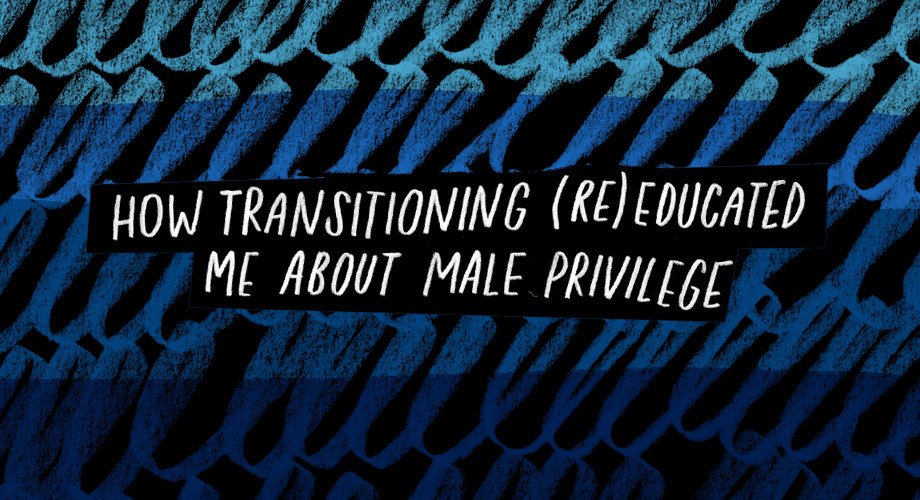In the Blog
How Transitioning Re-Educated Me About Male Privilege

Artwork by Erin McPhee
I have always identified as a feminist. For me, part of identifying as a feminist means recognizing that male privilege exists. However, it was not until I started transitioning and started being’’ read’ as male by society that I realized how much male privilege permuates societies.As my transition progressed, I began to ‘pass’ as male in social, legal and medical contexts. Because of this , my understanding of male privilege plays’ itself out in my life grew more nuanced. Socially, the instant, I was up and staggering around outside after my top surgery, I began to notice differences. In cisnormative spaces, I no longer had to automatically brace myself to endure cissexist comments and microaggressions directed at me personally. Unless I ‘outed’ myself as trans*, cis people assumed that I was a cis male, someone who had been assigned male at birth and never wavered from this gender identity. I am not going to list at length all of the automatic socially privileges I acquired once I had ‘passing privilege’ as a man; Other trans* folk have done that much clearly and concisely. I see no need to duplicate their work. (read here and here)
What was fascinating to me was how these social privileges of passing as a man did not spill over into legal or medical privileges. This was because at the time I began my transition, the battle for the right of people to change their gender status on legal documents was only beginning to be fought in Canada. As a person with multiple dis/abilities, I was keenly aware of this discrepancy every time I went to medical appointments. The healthcare system in Canada relies on legal government documents to confirm a person’s’ status and accompanying right to access healthcare.
Watching the male privilege I had acquired by passing as cis evaporate time and time again was frustrating , to put it mildly.The realities of a cissexist legal and medical system rooted in cissexism meant that everytime I had to show government Identification, I was outing’ myself as trans*. Activities and spaces that were safe for cis men, where they could expect respectful treatment because they were cis were unsafe for me in an emotional and physical sense the instant I was ‘outed.’ These activities include ordinary tasks like searching for housing and employment; Unsafe spaces included gyms and academic spaces where I needed to enroll in classes and programs by showing identification. This was stressful. It was for my own mental wellness that I decided to take on the expensive, time-consuming task of changing my gender status on my identification when it became legal in Ontario.
It was only after that, as I haltingly described this decisions and its’ reasons to other trans* folk that I realized I was not alone in discovering the existence of cissexism and accompanying oppression that comes with being trans* and not passing as cis in society. Hearing these stories of inequity, mostly noticeable inquiry surrounding healthcare for trans* folk and particularly from trans* women of colour, I understood that resting on the mountain of privilege I had acquired because I could now pass a cis white man was not something I was comfortable doing.
It is because of these knowledges I gained from being a person who was assigned female at birth and transitioned socially, legally and medically to being a trans* masculine person that I decided to work to confront the inequities faced by all folks under the trans* umbrella. In this world of cissexism, I am lucky enough to have ‘passing privilege’. I see it as essential that this privilege be eradicated. It is an artificial divide which causes untold hardship for countless trans* folks. It invisibilizes us as trans* folks, serves to prop up a socially constructed gender binary, and leaves us deliberately unheard in the dialogue surrounding social, legal and medical state services for trans* folk.
Maverick Smith is a deaf*, queer, trans*,dis/abled person, who uses ‘they/them’ pronouns Maverick Smith, has always been passionate about social justice and equity. A published writer, poet and an editor, Maverick currently resides on the traditional lands of the Mississaugas of the New Credit where they are engaged in community work related to intersectionality of their various identities.



